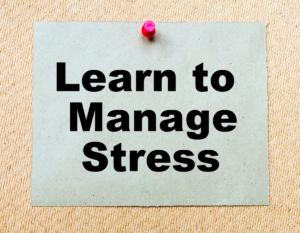Stress is an inevitable part of life, but it can have serious consequences when trading.
Trading, especially day trading, can be an intense career choice. The pressure to make timely decisions, manage risks, and navigate market volatility can take a toll on traders, both physically and emotionally.
Is day trading hard? Day trading can be challenging, but just like how a stone can reshape with the passage of water over time, persistence and learning can lead to mastery in this field.
The demanding nature of the job often leads traders to question the difficulty of mastering this craft, leading to stress. This article explores the causes of trading stress and offers practical strategies to cope with it.
What is Stress?
Stress is the body’s reaction to any demand made on it. It can be physical, mental, or emotional and is the body’s way of protecting itself from harm.
Stress can be beneficial in small doses, as it can help us stay focused, motivated, and alert. However, when we experience too much stress, it can harm our physical and mental health and trading performance.
The physical effects of stress can include headaches, muscle tension, nausea, chest pain, and fatigue.
It can also affect our mental and emotional state, leading to feelings of anxiety, depression, and irritability – all of which can hurt our trading performance.
The Nature of Stress on Trading
Stress is an inherent part of the trading profession. The uncertainty, ambiguity, and complexity of financial markets create an environment that can be mentally and emotionally taxing.
Day trading involves buying and selling financial assets such as stocks, cryptocurrencies, or forex within a single day, intending to make a profit.
Is day trading ethical? While it can be lucrative when done correctly, it also comes with its fair share of stress and anxiety.
While some traders can handle these stressors with ease, others may find themselves overwhelmed and prone to trading stress.
Rookie traders are calling it quits, further highlighting the difficulties faced in the trading world.
Studies reveal that about 90% of individuals who venture into trading fail within a few weeks. The primary reason for this high failure rate is the stress associated with trading losses.
When traders lose significant amounts of money, it can lead to severe psychological issues, including stress and depression.
It is important to recognize that choosing to trade is often driven by the thrill and excitement associated with profit potential.
However, as the initial excitement fades, traders may start to experience the pressures of meeting financial obligations and the constant need to perform in a highly competitive industry. This shift in perspective can lead to increased stress levels.
Identifying the Signs of Stress in Trading
Recognizing the signs of trading stress is crucial for maintaining mental well-being. However, it isn’t always straightforward.
Many people suffering from emotional distress may not even be aware of their condition. Stress can manifest in various ways, both physically and psychologically.
Insomnia and sleep disturbances are common stress indicators, as the mind becomes preoccupied with market fluctuations and potential outcomes.
Sudden mood swings, feeling disconnected from one’s surroundings, and a general sense of idleness and laziness can also be signs of stress.
Negative attitudes towards life and a sense of failure in trading may further exacerbate stress levels.
Physical symptoms, such as frequent flu or digestive problems, may also arise due to chronic stress.
It is important to be mindful of these signs and take proactive steps to manage stress effectively. If left unchecked, these symptoms can escalate to depression.
Strategies for Handling Stress in Trading
1. Determine your Financial Capacity.
One of the primary reasons for trading stress is the fear of losing money. Traders should assess their financial situation and determine how much they can afford to lose.
Don’t bite more than you can chew. Set a realistic trading capital that aligns with your risk tolerance. This can help reduce anxiety and panic during volatile market conditions.
It is crucial to avoid placing excessively tight stop losses that could result in significant cumulative losses.
By setting affordable trading capital, traders can mitigate stress and make more rational decisions.
2. Engage in regular exercise and mindfulness activities
Physical exercise is an effective way to reduce stress and promote overall well-being. Engaging in activities such as running, swimming, or yoga can help release endorphins and improve mental clarity.
Additionally, practicing mindfulness techniques, such as meditation or deep breathing exercises, can help calm the mind and alleviate stress.
By incorporating regular exercise and mindfulness activities into their routine, traders can enhance their resilience and ability to cope with trading stress.
3. Healthy Eating Habits
Eating nutritious foods fuels the body with essential nutrients, supporting optimal brain function and hormonal balance.
Incorporating fruits, vegetables, and whole grains can stabilize blood sugar levels, promote a sense of calmness, and reduce cortisol, the stress hormone.
A well-nourished body fosters resilience against daily stressors, enhancing overall well-being.
4. Seek Support from a Trading Community
Joining a trading community or engaging with fellow traders can provide a valuable support system.
Connecting with individuals who understand the challenges and experiences of trading can help alleviate feelings of isolation and provide a platform for sharing insights and strategies.
A community of like-minded individuals, whether through physical meetups or online forums, can provide emotional support and a sense of camaraderie during stressful trading periods.
5. Avoid multitasking and maintain focus
Multitasking may seem like a way to increase productivity, but it can actually have detrimental effects on trading performance.
Studies suggest that the human brain functions optimally when it focuses on a single task at a time.
Constantly shifting attention between multiple charts or market indicators can decrease attentiveness and lead to suboptimal decision-making.
Traders should prioritize monotasking, dedicating their full attention to analyzing a single chart or market aspect for an extended period. By doing so, traders can improve their focus, enhance analysis capabilities, and reduce stress associated with information overload.
6. Set realistic expectations and manage commitments
It is crucial for traders to set realistic expectations and manage their commitments accordingly.
Trading success takes time, skill, and patience. It is important to understand that consistent profitability in the market requires continuous learning and adaptation.
Traders should avoid getting carried away by initial successes and over-committing themselves. By managing expectations and commitments, traders can alleviate unnecessary stress and maintain a balanced approach to trading.
7. Prioritize quality time with loved ones
Amidst the demands of trading, it is essential to prioritize quality time with loved ones.
Maintaining strong relationships with family and friends can provide emotional support and help traders unwind from the pressures of the market.
By creating a schedule that includes dedicated time for loved ones, traders can strike a healthy balance between their personal and professional lives.
Engaging yourself in activities outside of trading can bring joy and relaxation, ultimately reducing stress levels.
8. Embrace losses as part of the trading journey
Losses are an inevitable part of trading. It is important for traders to adopt a healthy mindset towards losses and view them as learning opportunities rather than personal failures.
By embracing losses as part of the trading journey, traders can reduce stress and focus on continuous improvement.
Analyzing mistakes and incorporating lessons learned into future trading strategies can lead to long-term success and resilience in adversity.
9. Recognize when it may be time to seek professional help
In some cases, trading stress may become overwhelming, affecting not only trading performance but also overall well-being.
It is important to recognize when stress levels are unmanageable and seek professional help if needed. Therapists or trading experts can provide guidance, support, and techniques for coping with stress.
Additionally, utilizing tools such as trading indicators or signals can help traders make informed decisions and reduce the emotional burden associated with trading stress.
Conclusion
Stress can have a serious impact on trading performance, leading to poor decision-making and losses. However, with the right strategies, traders can manage and reduce stress while trading.
These strategies include developing a trading plan, mindful breathing and meditation, exercise and healthy eating habits, and seeking help from a mental health professional.
By managing stress, traders can make more rational decisions and improve their trading performance.
- 8 Best Prop Firms USA: Real trader Reviews and Payouts - March 10, 2025
- Forex Trading in Uganda: Start With $10—An Incredible Opportunity on a Tight Budget! - February 24, 2025
- Master Forex Trading Algorithms: Your Path to Success in 2025 - February 17, 2025







